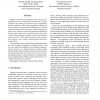Free Online Productivity Tools
i2Speak
i2Symbol
i2OCR
iTex2Img
iWeb2Print
iWeb2Shot
i2Type
iPdf2Split
iPdf2Merge
i2Bopomofo
i2Arabic
i2Style
i2Image
i2PDF
iLatex2Rtf
Sci2ools
IPPS
2002
IEEE
2002
IEEE
Achieving Scalability in Parallel Tabled Logic Programs
Tabling or memoing is a technique where one stores intermediate answers to a problem so that they can be reused in further calls. Tabling is of interest to logic programming because it addresses some of most significant weaknesses of Prolog. Namely, it can guarantee termination for programs with the bounded term-size property. Tabled programs exhibit a more complex execution mechanism than traditional Prolog’s left-to-right search with backtracking. The reason is that Prolog programs are highly recursive and generate multiple answers. This rather involved execution mechanism requires a more complex implementation than traditional Prolog. The declarative nature of tabled logic programming suggests that it might be amenable to parallel execution. On the other hand, the complexity of the tabling mechanism, and the existence of a shared resource, the table, argues that parallelism might be limited, and that performance for real applications might never scale. In this work we prove that...
Distributed And Parallel Computing | Execution Mechanism | IPPS 2002 | Tabling | Traditional Prolog |
Related Content
| Added | 15 Jul 2010 |
| Updated | 15 Jul 2010 |
| Type | Conference |
| Year | 2002 |
| Where | IPPS |
| Authors | Ricardo Rocha, Fernando M. A. Silva, Vítor Santos Costa |
Comments (0)

